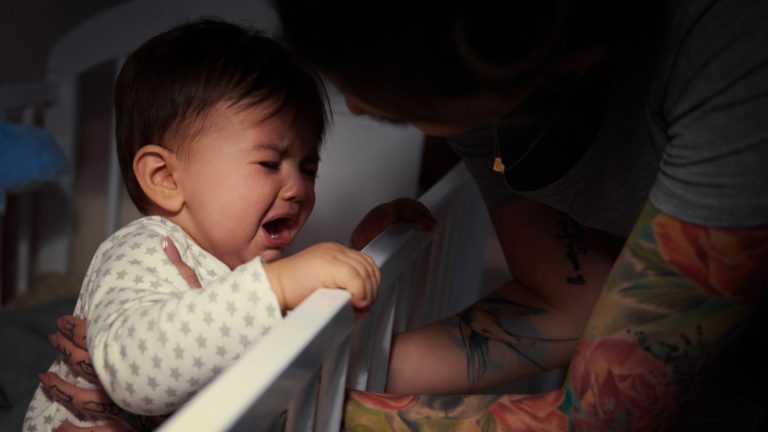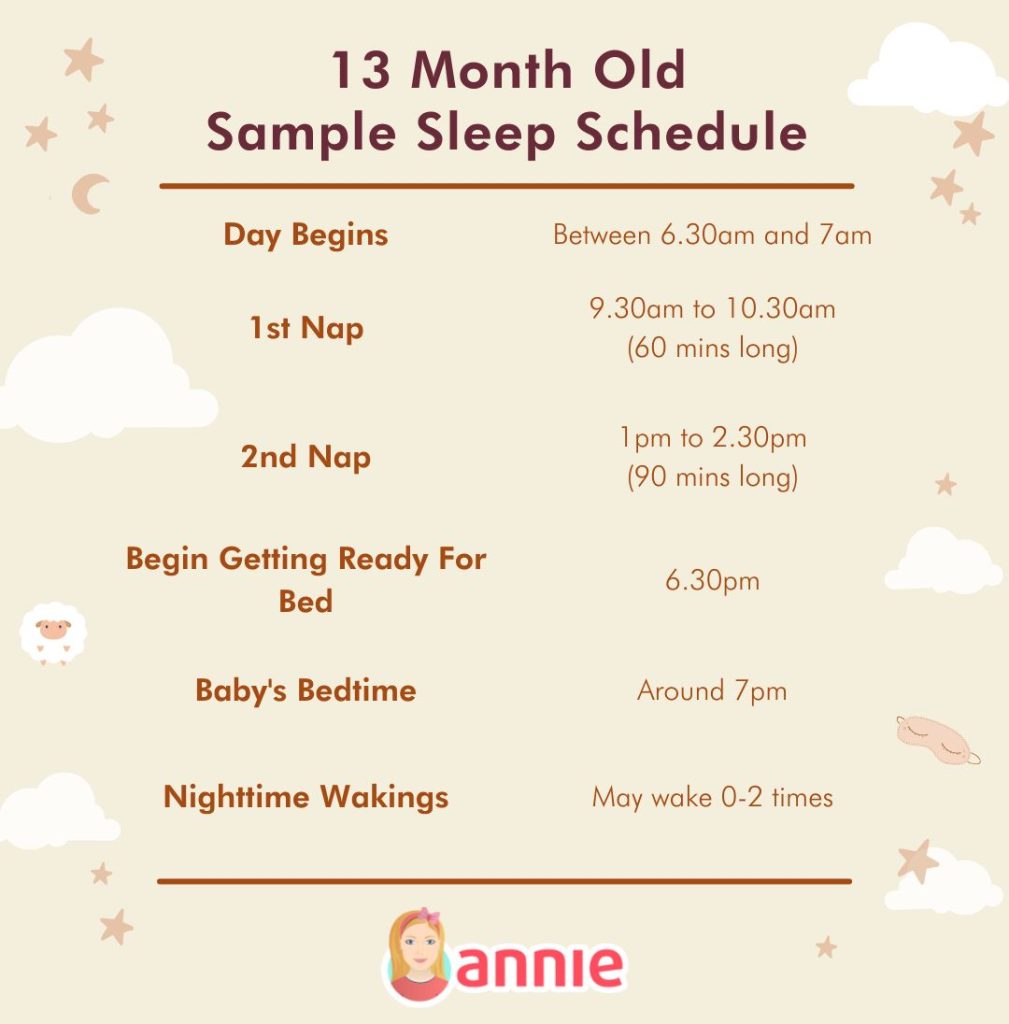
Navigating the 13 Month Sleep Regression: What to Expect and How to Help Your Baby
- Created:
1. 11. 2023 - Updated:
8. 11. 2023
At 13 months, you’ve probably seen it all with your baby. From feeding schedule adjustments to developmental milestones, you’d expect nothing to come as a shocker.
Newsflash:
While navigating the 13 month sleep regression, you need all the help you can get.
The good news is:
That’s what we’re here for!
So, follow along as we explore the 13 month sleep regression and how to help your baby through it.
Why 13 Months is a Common Time for Sleep Regression
Here’s the thing:
The 13-month-old mark is a turning point for your baby’s development. Up until 13 months, your baby undergoes changing feeding patterns, fluctuating wake windows, and other developmental milestones like:
- Mastering their crawling
- Cruising along furniture
- Learning to stand independently
- Saying one or two recognizable words
- Pushing arms and legs through clothes while dressing
- Holding a crayon and scribbling
Unsurprisingly:
These processes directly affect their sleep, resulting in the 13-month sleep regression. Essentially, this sleep regression is a period when your baby has difficulty sleeping or wakes up too often.
Now:
Aside from developmental processes, changes to their environment or routines can affect how well they sleep.
For example:
At 13 months, your baby might transition to a crib. And since your baby isn’t used to sleeping in the crib, they might feel uncomfortable or even unsafe. Hence, they might find it difficult to sleep.
Also:
Around 13 months, your baby’s feeding pattern will change. This means you have to change their feeding routine as well.
So if the gap between their feeding and sleeping time is too wide, they might wake up due to hunger. And if the gap is too small, the baby might feel too uncomfortable to sleep.
In any scenario:
Navigating new routines, patterns, and even developmental processes can be daunting for both the parent and the baby. So, it’s best to watch out for your baby’s cues and always consider them while sailing these waters.
Signs of the 13 Month Sleep Regression?
It’s no secret:
If your baby finds it hard to sleep, it automatically puts your rest at risk. And it’s even worse when you don’t know what the problem is or how to solve it.
Fortunately:
Knowing the signs of the 13 month sleep regression can help you identify the problem and procure working solutions. As such, below, we’ll talk about the various ways this sleep regression presents in 13-month-olds.
1. Increased Night Wakings
Check this out:
One of the earliest signs of the 13 month sleep regression is increased night wakings.
Fundamentally:
This means your baby might wake up more often than usual at night.
According to the Pediatric Sleep Council, infants around 12 months typically sleep 11-14 hours daily. During this period, they generally sleep all through the night. And as they grow, their nighttime sleep duration per session only grows longer.
As such:
If your 13-month-old wakes up frequently through the night, it might be a sign that they’re experiencing sleep regression.
2. Difficulty Falling Asleep
The thing is:
A baby resisting sleep can be a sign of many things. It could simply mean they’re uncomfortable, and it can also signify something more serious, like a health issue.
However:
An easy way to tell the cause of this sleep resistance is by observing a routine for your baby.
For example:
If your baby normally sleeps calmly but suddenly starts resisting sleep, they might be experiencing sleep regression.
The 13 month sleep regression could also be present without the discomfort. The baby could just be excited and eager for their new milestones. This excitement prevents them from falling asleep.
Note:
If your baby displays signs that make you concerned about their ability to fall asleep, consult an expert for help.
3. Shorter Naps or Nap Resistance
Similar to nighttime resistance, if your baby is experiencing the 13 month sleep regression, they might resist daytime sleep.
Here’s what happens:
Before 13 months, your baby takes more naps during the day. At 13 months, the baby might not take as many naps. They might even switch to just one nap, and that’s normal.
However:
It gets concerning when your baby shows a drastic resistance to daytime sleep or has way shorter naps.
At this point, it’s quite evident that they have sleep regression.
Now, don’t get me wrong, mild sleep regression at this age is normal. But, if you feel concerned about your baby’s sleep patterns, consult a pediatrician immediately.
4. Increased Fussiness or Irritability
Fact:
Fussiness and irritability are emotional symptoms of the 13 month sleep regression.
Basically:
If your baby is experiencing this sleep regression, they might cry when you put them in bed. They might also kick around, reach out to you, or move around to express their emotions.
So:
If you notice your usually calm baby throwing tantrums when it’s time for bed, they might be experiencing sleep regression.
Again:
You can attribute this sign to a number of factors, including discomfort or developmental processes like teething.

Causes of the 13 Month Sleep Regression
Before we get started:
The 13 month sleep regression is normal in infants. And it’s expected, especially since they’re growing up so fast.
Considering this:
To effectively navigate this phase with your child, you must know what could cause the sleep regression.
With that said:
Here are some of the causes of the 13-month sleep regression:
1. Teething
Hear me out:
While some babies might have passed the teething phase of their development at 13 months, others might just reach it. After all, all babies are different.
Now:
While your baby is teething, they experience pain that makes them too uncomfortable to fall asleep easily.
So, when you try to put your baby to sleep, you might notice them start to cry or make a fuss. And it would take time to calm them enough to fall asleep.
If this continues, your baby starts sleeping later, thus disrupting their sleep patterns.
2. Separation Anxiety
Listen:
It’s not abnormal for a baby to have separation anxiety.
In fact:
It is a normal stage of development where the child gets fussy if they lose sight of their parent. This often shows how much the child has bonded with their parents.
So, it doesn’t necessarily signify an issue, especially since most children grow out of it by age 3.
However:
Separation anxiety does affect your baby’s sleep.
I’ll explain:
If your baby has separation anxiety and falls asleep in your arms, the moment you lay them in bed, they’ll wake up. Then again, they might not wake up immediately, but once they can’t feel your presence, they wake up and begin to cry.
Ultimately:
As time progresses and your baby continues to do this, they’d take longer than normal to sleep. Thus, this changes their sleeping routine.
3. Motor Skill Development
At 13 months, your baby’s got some cool new superpowers, and they’re definitely not scared to explore them.
The thing is:
On paper, it sounds like good news, and it is. But it comes with a catch.
The excitement of being able to move their hands, feet, and body more could cause overstimulation before bed. In turn, it could make them unable to fall asleep.
Consequently:
You could lay your baby to sleep and come back five minutes later to find them laughing and playing in their bed.
4. Changes in Routine
It’s no news:
Baby routines change on a regular basis, and it’s completely okay. The only hiccup in these changes is that the baby needs time to adjust to them.
For example:
If you’re introducing a new feeding schedule to your baby, they might get hungry at different times than usual. If they get hungry while they’re asleep, they could wake up with a fuss, thus disrupting their sleep.
In addition:
Changing their daycare or sleeping environment could make the baby uncomfortable since they’re used to a different environment.
How to Handle the 13 Month Sleep Regression?
Admit it:
It bugs you when your little one is going through this phase, and it’s even worse when you don’t know how to help them.
Well, I have good news:
There are various ways your child can conquer the 13 month sleep regression, but it’d take some help on your part.
Here’s how to handle the 13 month sleep regression:
1. Maintaining Consistency
Let’s face it:
Babies like consistency. In fact, they thrive best when they have specific patterns of doing things like eating, sleeping, and even playing.
As such:
Maintaining consistency in your baby’s sleeping routine helps their body automatically get ready once it’s time for bed.
Plus:
It’s never a good idea to allow hiccups in a sleeping routine when your baby has already adjusted to it.
So, you must ensure that once it’s time for bed, they’re not overstimulated, hungry, or overtired so they can sleep comfortably.

2. Comfort Measures
If your baby is experiencing uncomfortable developmental milestones like teething or separation anxiety, you can help them sleep better with comfort measures.
For example:
Teething toys can help soothe the discomfort and pain that comes with teething. So your baby doesn’t have to struggle to sleep.
You can also make use of white noise to calm your baby down if they have separation anxiety. This method makes them feel safe and calm enough to fall asleep and stay asleep.
3. Nap Strategy
Generally:
Around 13 months, babies start to transition to one nap.
However:
This might not be the case for all babies. So, it’s best to watch your baby’s cues and preferences so you can plan their naps accordingly. This means they could either have longer naps or shorter ones.
Basically:
To help your baby through this phase, you have to develop a nap strategy for them and stick to it. This means you must study their wake windows and plan their nap duration, time, and frequency according to their needs.
This way, they can naturally settle into their nap routine without risking the 13 month sleep regression.
4. Parental Self-Care
Listen:
As much as you want to navigate the 13 month sleep regression, you must care for yourself too.
We’ve seen it play out before:
The parent can get so cooked up with taking care of the baby that they completely forget they’re human. This could land you in a tirade of negative emotions like stress, anxiety, and exhaustion. And that’s never ideal.
Without a doubt:
The 13 month sleep regression is a stressful phase. However, you must take care of yourself so you can be fit enough to efficiently monitor your child and help them through this stage.
Final Tip: Annie Baby Monitor – Your Sleep Helper for Newborns
Babies and their sleeping habits can be quite puzzling!
But don’t worry, with Annie Baby Monitor’s baby tracking feature, you can keep an eye on your little one’s sleep patterns without any hassle.
Annie Baby Monitor baby tracker allows you to keep a watchful eye on your newborn’s sleep duration. By collecting and analyzing this valuable data, you can identify patterns and create a sleep routine that suits your baby’s needs.

So, if you’re navigating the world of newborn sleep, let Annie Baby Monitor be your trusted sleep helper.
Conclusion
Let’s run it through one last time:
The 13 month sleep regression prevents your baby from sleeping easily, calmly, and properly. It can present signs such as difficulty sleeping, increased night wakings and fussiness, and shorter naps.
Generally:
This sleep regression happens due to separation anxiety, changes in routine, and developmental milestones like teething and motor skill development.
But you can handle the 13 month sleep regression by:
- Maintaining consistency
- Carrying out comfort measures
- Developing a nap strategy
- Indulging in parental self-care
Remember:
The 13 month sleep regression is normal, so you don’t need to panic if your baby shows its symptoms. With a little help from you, your little superhuman would power through this phase like a breeze.
As always:
If you found this article insightful or you have any questions, don’t hesitate to let me know in the comments.






